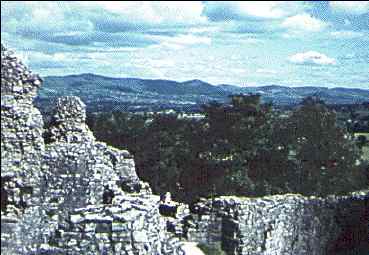Henry IV (3)
Shakespeare's Henry IV, Part Two deals in part with yet another northern rebellion under the leadership of Lord Scrope*, Archbishop of York. But the execution of the Archbishop was unpopular and his tomb became a place of pilgrimage. Archbishop Scrope was the first ecclesiastic in England to be condemned in a civil court by secular authorities.
Shakespeare combines Scrope's rebellion with the activities of the Earl of Northumberland, conspicuously absent at Shrewsbury, who continued to stir up trouble until Henry's victory at Bramham Moor (1408). Owain Glyndwr remained for long a going concern, though the Welsh were temporarily subdued around the same time.
The castle
Denbigh Castle was built in North Wales as a defence against the Welsh. In 1399 it was the headquarters of Percy Hotspur; soon after, the town it was supposed to defend was burned by Owain Glyndwr.
During the Wars of the Roses it changed hands several times. It was later owned by the powerful Earl of Leicester during the reign of Queen Elizabeth.
Footnotes
-
Archbishop Scrope
Richard Scrope was the brother of Richard II's minister, the Earl of Wiltshire, who was among those executed by Henry Bolingbroke and his supporters on their arrival in London (before Richard was deposed).
